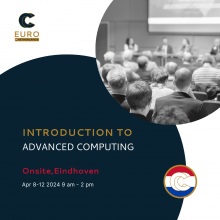For whom?
This introductory course is aimed at first-time and novice users of high-performance computing facilities. Many researchers can benefit from using a such supercomputing facilities to speed up their research or enable them to solve bigger problems.
Sign up
What to expect?
Day 1 & 2
In the first two half-day sessions (primer course) you will learn how to use (remote) Linux machines, demystify the Linux terminal, upload & edit files, automating tasks etc. We will cover the basics of file version control using Git. In addition, we will talk about the “supercomputing staircase” and how you as a TU/e researcher can gain access to suitable computing facilities, both local & national. The knowledge in this course is also a prerequisite for other sessions in the Spring HPC School.
Day 3
The third day will be an introduction to spuercomputing with hands-on. If you need to perform many calculations, or analyses that are too big for your own system, clusters and supercomputers will provide the computing power you need. You will learn how to work with these large computing systems!
During this do you will:
- understand what is high-performance computing (HPC)
- learn basic details on clusters and supercomputers
- do practical exercises on the national supercomputer Snellius effectively
- apply the essential best practices on how to work effectively with large HPC systems
Day 4
Finally, the fourth day will be dedicated to cloud computing. Do you want to create and manage your own work environment and run powerful applications on it? SURF Research Cloud opens the door to cloud computing on different platforms. During this day, your workload runs on the SURF HPC Cloud platform in Amsterdam.
Prerequisites
- Basic knowledge of Unix shell is useful.
- Bring your own laptop.
- A browser (Chrome or Firefox is good enough).
- Experience with Linux commands helps, but is not a requirement.
Sign up
